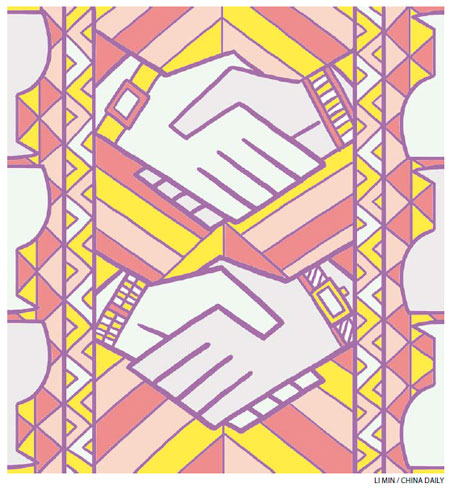Being polite, the Chinese way


Lawrence Sterne, the Anglo-Irish author of the novel The Life and Opinions of Tristam Shandy, Gentleman, once observed that "to have respect for ourselves guides our morals; and to have deference for others governs our manners".
The aphorism encapsulates recent scholarship on measuring "distance" in terms of culture, government, geography and economics of your corporate home country, relative to that of the target countries in which you are seeking to invest. The first you know very well, and the second you have all to learn about.
In the case of China, a huge and varied country, with different topographies and cuisines, as likely as not there will be plenty to learn about, especially if the investor comes from North America and Europe.
A business from the US used to the predominance of federal over state law, the division of powers in Washington, or the highly competitive and integrated markets of the home country, will find much similarity in China. But the differences will be even greater, starting with the language. So lesson No 1 is that, even if you do consider yourself a fluent Mandarin speaker, it will be advisable to bring along a trusted interpreter to your negotiations. Your knowledge of Mandarin will be appreciated as a courtesy by your hosts; but it is as well to remember that in negotiations you think clearest in your mother tongue.
A business from Europe would also see much in common between the profile of China and that of the European home market. But the comparisons would be notably different to that of the American. The EU now has 27 member states, each with its own institutions, economic structures and loyalties, while China holds more than 30 provincial administrations, many of them with populations up to twice the size of the largest EU member states, and countless medium size cities with populations larger than the plurality of European states.
Europeans can find themselves at home in China's diversity, but it is worth remembering that China is one country. It would be bad manners for EU enthusiasts to point out that at the Beijing Olympic Games the EU member states cumulatively won 2.5 times more medals than the Chinese team. It might be best to humbly point out that no European national team did as well as China's.
Whatever the contrast between your home country and China, business relationships in China are built through the exchange of favors and over dinner and other social events, not just in the boardroom and on the pages of a contract. So once you have decided on investing in China, and have an idea of the territory in which to locate operations, it is a good idea to brush up on Chinese culture.
Lesson No 2, though, follows immediately from the first. You are what nature and nurture have made you, so do yourself a favor and respect the standards of behavior you observe at home, while bearing in mind that your Chinese interlocutors as likely as not will be doing the same. As one CEO of a major European corporation told me, the reason his people get on so well with their Chinese counterparts is that both know they are different.
There are, in fact, a host of behaviors that have their analogues across cultures. One of particular significance in China is "face", which loosely translated would mean "respect" for your interlocutor. The way people perceive themselves to be perceived is common to all societies. In China this can involve you in some intricate footwork. The last thing that you would wish for yourself or for your negotiating team is to appear to lose respect, say because of a lack of technical mastery of your material or, even worse, to be seen as the cause for challenging the "face" or respect of your interlocutor.
China, too, like many cultures, is a culture that respects age, despite the feature of the modern world of fast changing technologies, where younger people may be better educated than their elders. This aspect of Chinese behavior is particularly salient because some of the older people you may meet in your business may have passed their youth tending pigs during the "cultural revolution" (1966-76), rather than attending school. Nonetheless, in ordering seating at a table, older people should be given preference. The first to be greeted should be the eldest, and not by a hearty welcome with a clap on the shoulder, but formally, through a handshake and with respect.
In some Western societies it is considered that the way to show purpose and power is to crush the extended hand of your interlocutor and to fix them deeply in the eyes, as if there was no secret of theirs that is hidden from you. Henry Paulson, secretary to the Treasury under president George W. Bush, deployed in addition his lantern jaw to subdue US senators into deferentially voting for his confirmation. Paulson then warned his audience at the spring 2007 Shanghai Futures Exchange that an open capital market allocated resources better than government fiat.
Two pieces of advise here. First, before you talk, find out about how the Chinese operate. China's financial system remains a crucial tool of public policy. Secondly, listening is a sign of respect because it indicates that you are intent on learning, that you recognize that you have much to learn, and that you can use your two ears even better than your one mouth.
Chinese people, like the rest of us, are gregarious, and look forward to having a comfortable relationship with you. They much appreciate if you can make a joke about yourself, so here goes. As a young man, I asked my parents-in-law for the hand of their daughter by presenting them with a bunch of what I considered to be rather lovely flowers, a bunch of chrysanthemums. Much laughter ensued because in Europe chrysanthemums are for funerals. In China try to avoid bringing flowers as gifts, as many Chinese associate them with funerals.
Not least, you will have to gird yourself for the pleasant task of eating out with your Chinese interlocutors. If you can learn to manipulate your chopsticks with a degree of ease, your efforts will be remarked on and appreciated; even better, if someone pours you tea during a meeting or dinner, you can tap your two fingers (bent) on the table as a way of saying thank you silently.
So: remember who you are; know your stuff; learn about the local culture and history; treat your interlocutors with respect; recognize seniority; listen, and talk less. Being polite is a universal requirement. In China, there are also some specific ways of being so.
The author is an emeritus professor of international political economy at INSEAD. The views do not necessarily reflect those of China Daily.
Today's Top News
- Economy seen on steady track
- Trade-in program likely to continue next year
- Li: SCO can play bigger role in governance
- Huangyan Island protection lifeline for coral ecosystem
- Latin America urgently needs green credit
- AI innovation powers China's lead in smart eyewear






























